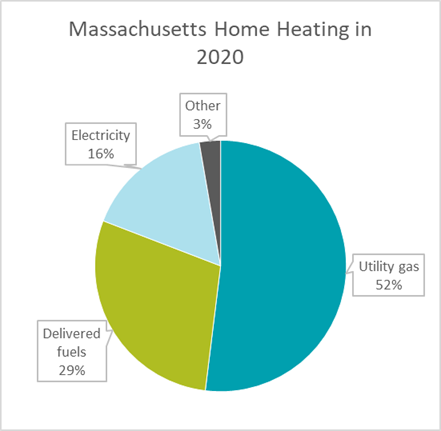

By Erin Cosgrove | Mon, December 19, 22
On November 30, 2022 the Massachusetts Commission on Clean Heat (Commission) issued its final report. The report included recommendations to implement a first-of-its-kind statewide building decarbonization clearinghouse and adopt new, innovative regulatory frameworks that accelerate the adoption of clean heat technology.
The Commission was a result of the recommendations from the state's Clean Energy and Climate Plan for 2025 and 2030. The Commission’s intention was to identify how the state could lower emissions from the building sector, especially those from the use of heating fuels (gas, oil, propane), to meet the five-year benchmarks mandated by An Act Creating a Next-Generation Roadmap for Massachusetts Climate Policy (Roadmap Act). The Commission was chaired by the state environmental agency, the Secretary of Energy and Environmental Affairs (EEA), and included 22 additional members with experience and knowledge of affordable housing, energy efficient building design and construction, healthcare, heating system design and technology, real estate, and heating fuel distribution.
The recommendations in the Commission’s final report included policy mechanisms to modify current stakeholder roles, implement new regulations, and establish a cross-cutting framework to accelerate building decarbonization and adoption of clean heat technologies across the state. There are three energy efficiency recommendations that NEEP is eager to see implemented as they result in first-of-their-kind programs and new opportunities for customers to engage with energy efficiency:
- Changing energy efficiency programs from a program- to a customer-centric approach.
- Recognizing the limitations of energy efficiency programs and a new role for them.
- Transitioning away from fossil-based heating through a clean heat standard.
Changing from a Program- to Customer-Centric Approach
Current energy efficiency programs are offered in a “program-centric manner” with incentives, technical assistance, and strategic planning administered across multiple programs and agencies. This puts the burden on customers or businesses to identify which rebates apply to their project and separately apply for each one. To ensure building decarbonization measures are adopted on the wide scale needed to achieve climate goals, programs must facilitate easier navigation and participation by customers. To do this, the Commission proposed Massachusetts look to pivot to a customer-centric approach so that residents and businesses can seamlessly navigate and access program offerings for energy efficiency, renewables, and electrification in one place. These programs would be offered through a statewide Building Decarbonization Clearinghouse (Clearinghouse).
The Clearinghouse will engage and support customers throughout the building decarbonization process and be a one-stop-shop for energy efficiency, electrification, energy storage, and renewable programs in the state. The Clearinghouse will not be a new effort but will act as an umbrella for existing programs and enable coordination among state agencies and across various programs, services, and funds, such as Mass Save, Solar Massachusetts Renewable Target (SMART), the Alternative Portfolio Standard (APS), MassCEC rebate programs, and the Renewable Portfolio Standard (RPS). The Commission also proposed the creation of a green bank that would operate under the Clearinghouse.
In addition to program offerings, the Clearinghouse will also focus on ensuring equitable transition of the building stock. To do this, the Clearinghouse will reach out to community organizations and include materials in multiple languages and will ensure contractors and other customer-facing experts are effectively trained and resourced to help underserved communities navigate programs and identify appropriate incentives.
Timeline: The Commission recommended that the Clearinghouse begin operating as a “one-stop-shop” in 2024 and provided steps that state agencies can take to begin designing and implementing this initiative.
Recognizing a New Role for Energy Efficiency Programs
The Commission’s second significant recommendation was to carve out a new role for energy efficiency programs offered by Massachusetts utilities under Mass Save. Mass Save and the other energy efficiency programs play an important role in decarbonization, as these programs are currently the largest providers of funding for state programs related to building energy efficiency and GHG reductions.
The Commission recognized that with support from the legislature, Mass Save has been able to transition to focus more on electrification and fuel switching measures, including setting GHG emission reduction limits in line with state climate goals and adopting the social cost of carbon. While Mass Save has been largely successful in achieving energy efficiency goals, the Commission found additional efforts are needed to achieve the pace and scale to meet Massachusetts climate goals.
The Commission proposed that Mass Save programs be reconstituted under the new Clearinghouse and be offered alongside other building decarbonization initiatives. For example, Mass Save can continue to implement in-home weatherization and pre-weatherization measures as part of the programs offered under the Clearinghouse. The Clearinghouse would oversee implementation of building decarbonization audits that identify and provide a wider range of program measures (solar, weatherization, heat pumps), presenting customers with a more comprehensive offering of all measures available.
Timeline: The Commission recommended that these changes take place for the 2025 and 2028 Mass Save program cycles.
Transitioning Away from Fossil-Based Heating
The final recommendation that we are excited to watch is the establishment of a Clean Heat Standard (CHS) to promote electrification of heating systems in the state. A CHS is a cap-and-trade or performance-based policy that sets a gradual cap on emissions from fossil-based heating systems and allows retailers to earn emission credits through a installing clean heat technologies.
Regulated entities would include utilities, wholesale liquid fuel and propane suppliers, and retailers as necessary to ensure that all fuel delivered to Massachusetts is covered under the standard. Electric utilities would not be required to join the program initially, but the Commission suggested they join at a later time to ensure there is efficient electric heat installed as fossil fuel use decreases. The Commission recommended that credits be made available for all strategies that reduce GHG emissions, with a strong preference towards pursuing electrification and addressing structural deficiencies in buildings. Specifically, credits should be made available for weatherization and energy efficiency, as well as extremely efficient new construction standards such as Passive House. Crediting should be established so that the building sector can achieve full decarbonization by 2050.
To protect against any inequitable outcomes of the CHS, the Commission outlined ways to ensure that the program is designed to include and protect underserved communities from the onset. This could be done through efforts such as requiring a number of credits be generated within underserved communities and engaging with community-based organizations. The Commission also highlighted the need to monitor, report, and correct any unintended consequences that may emerge as a result of these policies.
Timeline: The Commission recommended the Massachusetts Department of Environmental Programs begin a regulatory process in 2023 with implementation starting in 2024.
Conclusion
The Commission on Clean Heat has outlined an ambitious and innovative suite of policies for Massachusetts that can work together to achieve the state’s building decarbonization goals. By establishing a customer-centric approach, more residents and contractors can understand and take advantage of incentives. Creating space for new actors can help to grow the reach of traditional energy efficiency programs beyond their historic limits, and can accelerate other complementary building decarbonization efforts in the state. Finally, a Clean Heat Standard can begin the transition away from the use of fossil fuel and encourage current distributors to transition their business model in line with state climate goals.


